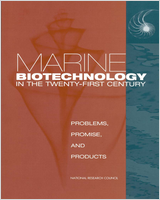NCBI Bookshelf. A service of the National Library of Medicine, National Institutes of Health.
Dramatic developments in understanding the fundamental underpinnings of life have provided exciting opportunities to make marine bioproducts an important part of the U.S. economy. Several marine based pharmaceuticals are under active commercial development, ecosystem health is high on the public's list of concerns, and aquaculture is providing an ever greater proportion of the seafood on our tables. Nevertheless, marine biotechnology has not yet caught the public's, or investor's, attention. Two workshops, held in October 1999 and November 2001 at the National Academies, were successful in highlighting new developments and opportunities in environmental and biomedical applications of marine biotechnology, and also in identifying factors that are impeding commercial exploitation of these products. This report includes a synthesis of the 2001 sessions addressing drug discovery and development, applications of genomics and proteomics to marine biotechnology, biomaterials and bioengineering, and public policy and essays contributed by the workshop speakers.
Contents
- THE NATIONAL ACADEMIES
- COMMITTEE ON MARINE BIOTECHNOLOGY: BIOMEDICAL APPLICATIONS OF MARINE NATURAL PRODUCTS
- Preface
- Executive Summary
- Biomedical Applications of Marine Natural Products: Overview of the 2001 Workshop
- Environmental Aspects of Marine Biotechnology: Overview of the 1999 Workshop
- 2001 Workshop Abstracts: Biomedical Applications
- Appendixes
- Appendix A Committee and Staff Biographical Sketches
- Appendix B National Research Council Project Oversight Boards
- Appendix C 2001 Marine Biotechnology Workshop: Biomedical Applications of Marine Natural Products: Agenda
- Appendix D 2001 Marine Biotechnology Workshop: Biomedical Applications of Marine Natural Products: Workshop Participants
- Appendix E 1999 Marine Biotechnology Workshop: Opportunities for Advancement of Environmental Marine Biotechnology
NOTICE: The project that is the subject of this report was approved by the Governing Board of the National Research Council, whose members are drawn from the councils of the National Academy of Sciences, the National Academy of Engineering, and the Institute of Medicine. The members of the committee responsible for the report were chosen for their special competences and with regard for appropriate balance.
This report and the committee were supported by National Oceanographic and Atmospheric Administration's National Sea Grant College Program, the National Science Foundation, The Whitaker Foundation, Minerals Management Service, Electric Power Institute, and the National Academy of Sciences. The views expressed herein are those of the authors and do not necessarily reflect the views of the sponsors.
